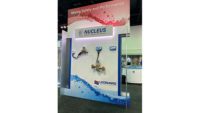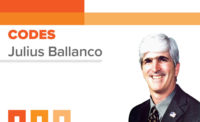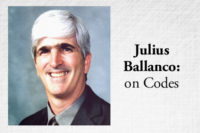The 2018 ASPE Convention and Expo is Sept. 28-Oct. 3 at the Georgia World Congress Center in Atlanta. If you are not planning to be there, you may want to change your schedule immediately to attend the event.
This is a year where major changes will take place on the ASPE Board of Directors. With Mitch Clemente, CPD, FASPE, completing his term as president, there will be a shift in several other positions. The Nominating Committee published its recommended slate of candidates. If the slate is elected, it would be the first time in more than 20 years that five Professional Engineers will serve on the ASPE board.
ASPE also recently hired Ramiro Mata as senior director of technical and regulatory affairs. My good friend Mata previously served in a similar capacity at CSA. He will be handling many of the codes and standards activities for ASPE.
ASPE has had a much greater presence in codes and standard activities. ASPE Executive Director and CEO Billy Smith, FASPE, currently is the chair of the ASME A112 Plumbing Standards Committee and he chairs the IAPMO WE•STAND Committee, not to mention his membership on the IAPMO Plumbing Technical Committee.
It is anticipated Mata will begin assuming more of Smith’s roles on codes and standards committees. Mata also will be showing up at the code hearings testifying on behalf of ASPE.
ASPE has submitted a number of code changes during the last three code-change cycles. It also has introduced many of its design standards into the plumbing codes. Some of the changes are related to research performed by the ASPE Research Foundation, including a revision to the sizing of storm-drainage systems. Another change includes the allowance of food-waste disposers on combination waste and vent systems.
A change that was implemented by Clemente is the expansion of the Research Foundation into the ASPE Educational and Research Foundation. The Foundation will work on establishing more educational programs and benefits on plumbing engineering. The change also should allow for more financial contributions to assist the good work that is done by the foundation.
Meet up
While attending the ASPE Expo, there are a number of meetings you should investigate taking place on the morning of Saturday, Sept. 29. The Education and Research Foundation will hold one of those meetings. This is where the foundation provides a report on activities and invites attendees to offer suggestions for research and education opportunities.
Another committee that will be meeting is the Legislative Committee. This is the committee performing the nuts and bolts review of codes and standards activities. The meeting also includes an open forum where anyone can suggest future changes to consider to the codes or standards. This meeting normally gets lively. Plumbing codes seem to bring that out in crowded meeting rooms.
One of the major changes ASPE made to this year’s convention is the elimination of the biannual banquet and replacing it with an awards breakfast with a keynote speaker. I am somewhat disappointed with the elimination of the banquet since I always look forward to putting on my tux for the formal affair. My hope is future ASPE boards return the banquet to celebrate the plumbing engineering profession.
ICC final action hearing
A few weeks after the ASPE Expo, ICC will hold the final action hearing Oct. 24-29 in Richmond, Virginia. The hearing will address the public comments submitted on proposed code changes. The monograph of the public comments can be downloaded from www.cdpaccess.com.
This hearing will finalize the technical contents of the 2021 edition of the International Plumbing Code, International Mechanical Code and International Fuel Gas Code. While it is only 2018, the 2021 version will be ready with everything but the administration requirements of Chapter 1 and the updating of the referenced standards in the last chapter of each code.
One of the hot topics related to plumbing is actually found in the Building Code. There is a public comment, with widespread support, regarding HDPE toilet and urinal partitions. The fire community believes these partitions are dangerous and will readily burn. The plumbing community knows better.
The Building Code requirements all but prohibit HDPE partitions. The public comment to a proposed change will result in HDPE partitions being treated the same as partitions made of other materials. The overly restrictive requirements for HDPE were added by overzealous consultants interested in promoting greater use of fire-retardant chemicals. However, those chemicals change the characteristic of HDPE partitions, making them unattractive to install.
While some in the fire-protection community are yelling, “The sky is falling,” regarding HDPE partitions, they have no fire data identifying a problem. The fire data actually shows the opposite; that there isn’t a fire problem. This doesn’t seem to stop the crying of a falling sky.
Supporting the consistent treatment of HDPE partitions includes Plumbing Manufacturers International, ASPE, Building Owners and Managers Association (BOMA), home builders and manufacturers. Those opposed are representatives of the fire-retardant chemical profession and competitors that do not manufacture HDPE partitions.
As reported in last month’s column, there will be plenty of discussion regarding hot water. The changes could impact new water heaters, as well as all shower and combination shower/tub valves. It is expected the minimum temperature of hot water will be moved upward to 120° F in the International Residential Code – Plumbing Section. A similar proposal will be discussed regarding a change to the International Plumbing Code.
The ICC schedule has mechanical through plumbing addressed from Oct. 27-29. If you have nothing to do over the weekend, you can either attend the hearings or at least watch them on your computer.
At the conclusion of the hearings, there will be a two-week period whereby governmental members can vote on the code changes. One of these days, the ICC Board of Directors will recognize how foolish the internet voting is. Members don’t have to watch any testimony nor do they have to read the code change. They can simply vote. The process diminishes the integrity of the code-change process.
I look forward to seeing many of you at the ASPE Expo in Atlanta.




